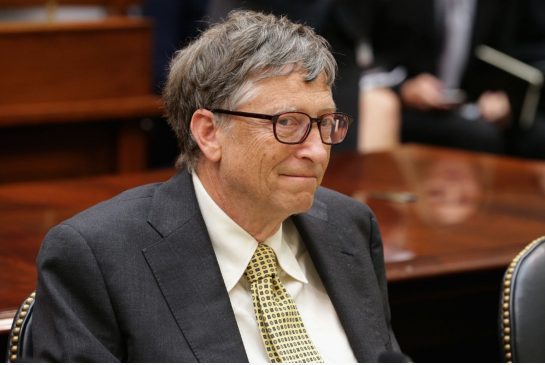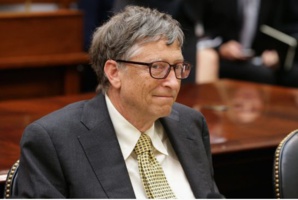Bill Gates is often compared with the legendary Steve Jobs, claiming that Microsoft founder has no foresight, unlike the creator of Apple. Indeed, Steve Jobs ideas often set new trends in the market, while Microsoft chose rather conservative approach, and otherwise, the results have been controversial (for example, Windows 8’s ergonomics).
However, Gates himself has repeatedly predicted the world will develop in the future. That vision allowed him time to create Microsoft, and literature often became the basis for forecasts. Bill Gates is not only a computer genius, billionaire and philanthropist, but also a bookworm. The legendary founder of Microsoft swallows a book a week, and won fame of an impartial and objective critic.
The businessman himself has written two books: The Road Ahead and Business @ the Speed of Thought. Interestingly, both are devoted to the influence of technology on the present and the future. In this article we describe the 10 predictions made in 1999 in his book Business @ the Speed of Thought. What is true?
1. Sites where one can compare prices
Bill Gates wrote that in the future the market will get the portals on which one can choose the best price for a particular product. Now this principle has one of the Google services and Amazon search, as well as pages such as NexTag PriceGrabber.
2. Smartphones and Tablets
According to Bill Gates' prediction, people should be able to not only communicate, but also to make the most important transactions from mobile devices - from financial transactions to booking a hotel. Partially forecast was justified in the era of PDAs and smartphones. But now, gadgets rule the world of consumer electronics, and their functions almost do not concede to full-fledged computers.
3. Health and Finance Online
Continuing this thought, Bill Gates said that the health and financial world will have a huge incentive to develop thanks to the Internet. In a sense it is. Not only health, but also the healthcare and state services as a whole gradually moved to the Internet. Payment systems like PayPal and Apple Pay changed the consumer market for ever.
4. Electronic assistants, Smart Homes
Google Now and Siri (Cortana being prepared for the launch) have confirmed Gates’ ideas that predicted the emergence of electronic assistants. As for the "Internet of Things" and Smart Home, then there is a revolution about to mature. However, so far all of these technologies have not been linked together, but all comes down to.
5. Surveillance Systems
Bill Gates said that the monitoring systems will be become public. Acamera that can capture important events can be installed in houses. This forecast is really true: no wonder Google bought Dropcam for $ 555 million. The growth speed of the Internet connection allows anyone to install such devices and protect themselves. Recall DVRs too, some models of which are also able to connect to the Internet.
6. Social Networks
By thinking of Bill Gates, websites where one can organize communication in a narrow range of interests, or with friends and family, should have appeared in the world. Facebook and other representatives of the "Web 2.0" solved this problem, but before, there were attempts nearly as successful, like Livejournal, or My Space.
7. Contextual advertising
The billionaire argued that advertising will adapt to the needs of a particular person, based on the analysis of the history of his purchases. This is really happening, and any of us faced with these systems during a search on Google. Modern systems can adjust a set of advertising as a specific query in a search engine and a query history. In fact, the number of sites, that collect information on user preferences, is growing steadily.
8. Adaptive promotions
Analyzing the history of purchases, the electronic system will offer discounts on related products and services, Gates said. That's right: Siri and Google Now are going offer the most favorable offers based on your search history; promotions are included in the algorithms of search engines, as well as of individual sites.
9. Chatting while browsing content on the site
According to Bill Gates, in our present, video should be possible to turn into feedback. Gates talked about sporting events, but in the end, the comment system, updated in real time, appeared on the vast majority of portals broadcasting anything. There are specialty services, such as, for example, Twitch, and integration with social networks such as Twitter.
10. Broadcasts come with contextual advertising
Many portals show themed commercials during the broadcast video. These videos are clickable and transferred to the advertiser's site. The most famous example - YouTube. The system does not always show relevant videos, but only if there is an agreement with advertising suppliers.
source: businessinsider.com
However, Gates himself has repeatedly predicted the world will develop in the future. That vision allowed him time to create Microsoft, and literature often became the basis for forecasts. Bill Gates is not only a computer genius, billionaire and philanthropist, but also a bookworm. The legendary founder of Microsoft swallows a book a week, and won fame of an impartial and objective critic.
The businessman himself has written two books: The Road Ahead and Business @ the Speed of Thought. Interestingly, both are devoted to the influence of technology on the present and the future. In this article we describe the 10 predictions made in 1999 in his book Business @ the Speed of Thought. What is true?
1. Sites where one can compare prices
Bill Gates wrote that in the future the market will get the portals on which one can choose the best price for a particular product. Now this principle has one of the Google services and Amazon search, as well as pages such as NexTag PriceGrabber.
2. Smartphones and Tablets
According to Bill Gates' prediction, people should be able to not only communicate, but also to make the most important transactions from mobile devices - from financial transactions to booking a hotel. Partially forecast was justified in the era of PDAs and smartphones. But now, gadgets rule the world of consumer electronics, and their functions almost do not concede to full-fledged computers.
3. Health and Finance Online
Continuing this thought, Bill Gates said that the health and financial world will have a huge incentive to develop thanks to the Internet. In a sense it is. Not only health, but also the healthcare and state services as a whole gradually moved to the Internet. Payment systems like PayPal and Apple Pay changed the consumer market for ever.
4. Electronic assistants, Smart Homes
Google Now and Siri (Cortana being prepared for the launch) have confirmed Gates’ ideas that predicted the emergence of electronic assistants. As for the "Internet of Things" and Smart Home, then there is a revolution about to mature. However, so far all of these technologies have not been linked together, but all comes down to.
5. Surveillance Systems
Bill Gates said that the monitoring systems will be become public. Acamera that can capture important events can be installed in houses. This forecast is really true: no wonder Google bought Dropcam for $ 555 million. The growth speed of the Internet connection allows anyone to install such devices and protect themselves. Recall DVRs too, some models of which are also able to connect to the Internet.
6. Social Networks
By thinking of Bill Gates, websites where one can organize communication in a narrow range of interests, or with friends and family, should have appeared in the world. Facebook and other representatives of the "Web 2.0" solved this problem, but before, there were attempts nearly as successful, like Livejournal, or My Space.
7. Contextual advertising
The billionaire argued that advertising will adapt to the needs of a particular person, based on the analysis of the history of his purchases. This is really happening, and any of us faced with these systems during a search on Google. Modern systems can adjust a set of advertising as a specific query in a search engine and a query history. In fact, the number of sites, that collect information on user preferences, is growing steadily.
8. Adaptive promotions
Analyzing the history of purchases, the electronic system will offer discounts on related products and services, Gates said. That's right: Siri and Google Now are going offer the most favorable offers based on your search history; promotions are included in the algorithms of search engines, as well as of individual sites.
9. Chatting while browsing content on the site
According to Bill Gates, in our present, video should be possible to turn into feedback. Gates talked about sporting events, but in the end, the comment system, updated in real time, appeared on the vast majority of portals broadcasting anything. There are specialty services, such as, for example, Twitch, and integration with social networks such as Twitter.
10. Broadcasts come with contextual advertising
Many portals show themed commercials during the broadcast video. These videos are clickable and transferred to the advertiser's site. The most famous example - YouTube. The system does not always show relevant videos, but only if there is an agreement with advertising suppliers.
source: businessinsider.com






